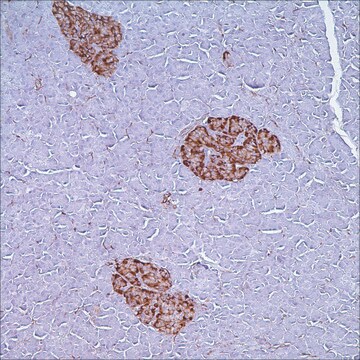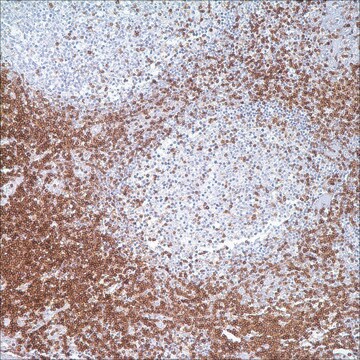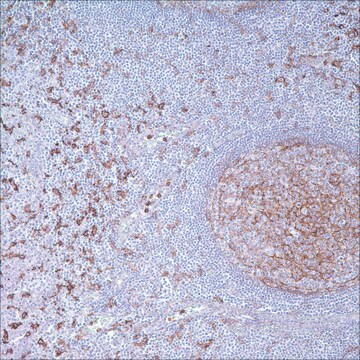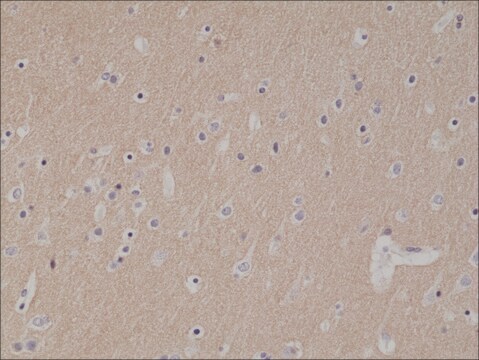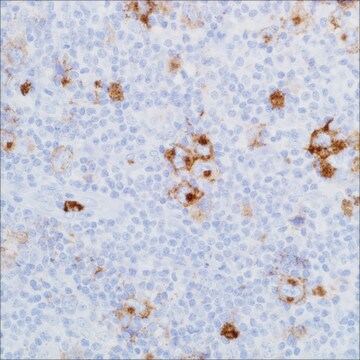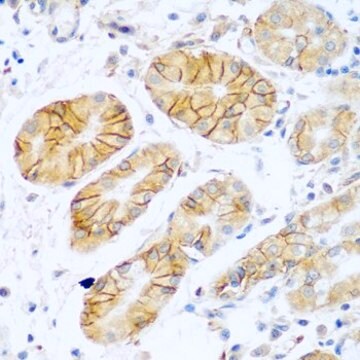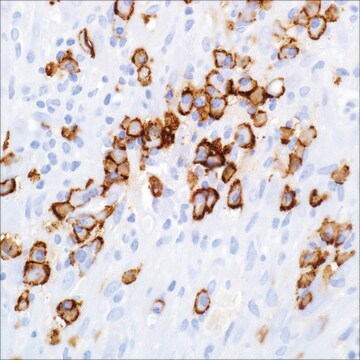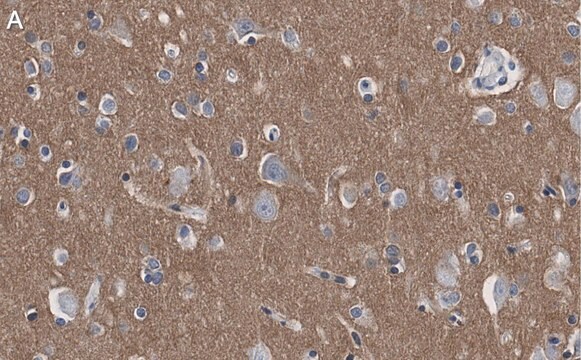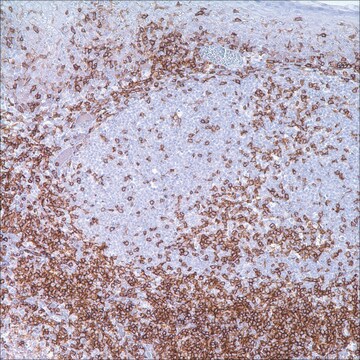推薦產品
生物源
mouse
品質等級
100
500
共軛
unconjugated
抗體表格
culture supernatant
抗體產品種類
primary antibodies
無性繁殖
123C3.D5, monoclonal
描述
For In Vitro Diagnostic Use in Select Regions (See Chart)
形狀
buffered aqueous solution
物種活性
human
包裝
vial of 0.1 mL concentrate (156M-84)
vial of 0.5 mL concentrate (156M-85)
bottle of 1.0 mL predilute (156M-87)
vial of 1.0 mL concentrate (156M-86)
bottle of 7.0 mL predilute (156M-88)
製造商/商標名
Cell Marque™
技術
immunohistochemistry (formalin-fixed, paraffin-embedded sections): 1:100-1:500
同型
IgG1κ
控制
neuroblastoma
運輸包裝
wet ice
儲存溫度
2-8°C
視覺化
membranous
基因資訊
human ... NCAM1(4684)
一般說明
Anti-CD56 recognizes two proteins of the neural cell adhesion molecule, the basic molecule expressed on most neuroectodermally derived cell lines, tissues and neoplasms (e.g. retinoblastoma, medulloblastomas, astrocytomas, neuroblastomas, and small cell carcinomas). It is also expressed on some mesodermally derived tumors (rhabdomyosarcoma).
聯結
CD56 Positive Control Slides, Product No. 156S, are available for immunohistochemistry (formalin-fixed, paraffin-embedded sections).
外觀
Solution in Tris Buffer, pH 7.3-7.7, with 1% BSA and <0.1% Sodium Azide
準備報告
Download the IFU specific to your product lot and formatNote: This requires a keycode which can be found on your packaging or product label.
其他說明
For Technical Service please contact: 800-665-7284 or email: service@cellmarque.com
法律資訊
Cell Marque is a trademark of Merck KGaA, Darmstadt, Germany
未找到適合的產品?
試用我們的產品選擇工具.
分析證明 (COA)
輸入產品批次/批號來搜索 分析證明 (COA)。在產品’s標籤上找到批次和批號,寫有 ‘Lot’或‘Batch’.。
R Gerardy-Schahn et al.
International journal of cancer. Supplement = Journal international du cancer. Supplement, 8, 38-42 (1994-01-01)
Monoclonal antibodies (MAbs) ranked together as small-cell-lung-cancer (SCLC) Cluster I MAbs are directed against the neural cell adhesion molecule NCAM (CD 56) and have been shown to be useful reagents in SCLC diagnosis and therapy. We analyzed the epitopes recognized
C E Moolenaar et al.
Cancer research, 50(4), 1102-1106 (1990-02-15)
Monoclonal antibodies (MAbs) 123C3 and 123A8 generated against a membrane preparation of a small cell lung carcinoma (SCLC) specimen recognize not only SCLC and bronchial carcinoids but also a significant portion of non-small cell lung carcinomas (non-SCLC) of various histological
R E Kibbelaar et al.
European journal of cancer (Oxford, England : 1990), 27(4), 431-435 (1991-01-01)
We investigated the expression of the neural cell adhesion molecule (NCAM) in a series of surgically resected lung carcinomas of various histological subtypes by means of a panel of monoclonal antibodies recognising different N-CAM epitopes. In a subgroup of 56
Scott A Ely et al.
The American journal of pathology, 160(4), 1293-1299 (2002-04-12)
Unlike monoclonal gammopathy of undetermined significance (MGUS) or non-Hodgkin's lymphomas (NHLs) with plasmacytoid differentiation, multiple myeloma (MM) is commonly associated with lytic bone lesions. Although the mechanisms of increased osteoclast activity are partially understood, comparatively little is known about the
Masahiko Sumi et al.
Leukemia & lymphoma, 44(1), 201-204 (2003-04-15)
We present a case of duodenal non-Hodgkin lymphoma in a 71-year-old woman. Immunohistochemistry characterized the lymphoma cells as CD2(+); surface CD3(-) but cytoplasmic CD3(+); CD7(+); and CD56(+) without a rearrangement of the T-cell receptor gene. Cells had a high N/C
我們的科學家團隊在所有研究領域都有豐富的經驗,包括生命科學、材料科學、化學合成、色譜、分析等.
聯絡技術服務